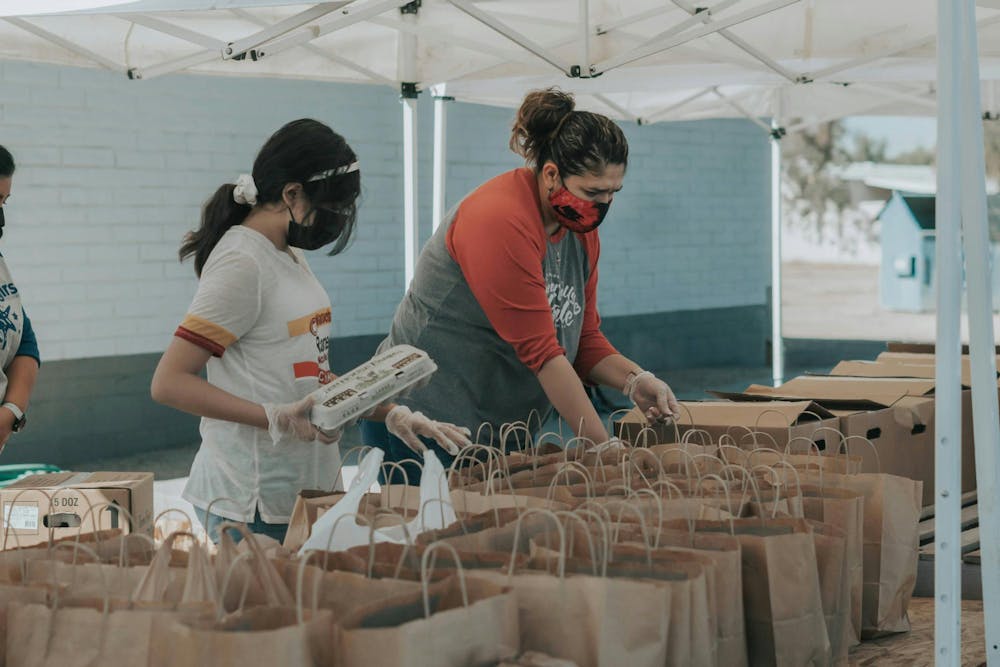Right on Notre Dame Avenue, just six blocks south of campus, sits the Northeast Neighborhood Food Pantry. The pantry is frequented by residents of the surrounding neighborhood, to whom it offers food and other essentials. One kind of visitor it rarely sees is Notre Dame students, despite being so close to us that you can see the dome from the driveway. This is the reality of Notre Dame’s relationship with poverty in South Bend: we keep it at arm’s length, close enough to study it but not so close that we have to touch it.
This is not, of course, to say that Notre Dame is not involved in service — quite the opposite. Notre Dame has put hundreds of millions of dollars into conferences, research centers, field trips, service events and other initiatives aimed at pro-social causes. We offer above-market wages to staff in an effort to support the working poor in South Bend. The question is, for all those millions of dollars, how come most Notre Dame students don’t know that there is a food pantry down the street? How come so many students graduate without having ever interacted with the community sitting a half mile away?
The answer lies in Notre Dame’s approach to service, which often seems more directed at marketability than results. Notre Dame students’ favorite kind of service is the type that looks good on a resumé: research, internships and fellowships. Our second favorite kind of service is the type that includes a cool trip to Appalachia or a different country. Our least favorite is the kind that requires sustained, unpaid interaction with the people of South Bend. I know this because I am a student, and I have felt the pressure to do something that is ethical-but-also-impressive-and-pays-well.
Notre Dame institutions have fed into these preferences. Google “Notre Dame” and “poverty” and you will find that Notre Dame’s new anti-poverty initiative will make us a leading institution in research on poverty. Students can intern at the Lab for Economic Opportunity, or attend hundreds of talks and courses on social issues or join a boxing league supporting a school eight thousand miles away. For Back the Bend, we gather in masses to do service in South Bend, but the work is mostly mulching, garbage clean-up or a task that doesn’t involve meeting any of the people we call “townies”. Again, these are all fantastic initiatives, but where are the opportunities to actually get to know our neighbors beyond the dome? At a school where 75% of students come from the top 20 percent, exposure to the real world is essential for keeping our campus community grounded, service-oriented, and attentive to social issues.
Look hard enough, and you will find that opportunities for community-engaged service do exist at Notre Dame, but they are typically underfunded and undermanned. These organizations include, but are not limited to the Shaw Center, La Casa de Amistad, TutorND and the Boys and Girls Club. They offer services through which students and faculty directly partner with community members to build relationships and attack social issues. I believe that if students and administrators prioritize these organizations, Notre Dame can overcome our reputation as a school of rich kids who are out of touch with the needs of the larger community.
Last semester, after some pleading from our ethics professor, some of my classmates and I began visiting Coquillard Elementary in South Bend every Friday. Coquillard is underfunded and understaffed, and just 3% of its students meet their expected reading level. My classmates and I help out with recess, bringing the supervision, structure and equipment that Coquillard cannot provide. It’s not a huge commitment — just two hours a week of playing outside, and there is so much more that the school needs — but already, I feel more like I am a part of South Bend, not just my university. I know the names of people who do not work or study at Notre Dame. I take more time to appreciate the gift that is my education, and as I apply for jobs, I think more about what would benefit my community, not just my career. It is my hope that other students could have similar experiences, and I urge my peers at Notre Dame to rally around a future where we actively love our neighbors.
Rose is a senior from Buffalo, NY with majors in economics and the Program of Liberal Studies. Her writing interests include ethics, campus culture and the intersection of economics, politics and philosophy. When she's not writing, you can find her reading on the 10th floor of the library, losing intramural basketball games or working at the Law School. You can contact Rose by email at rquinla2@nd.edu.










